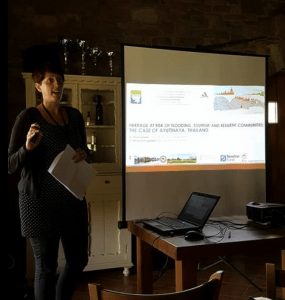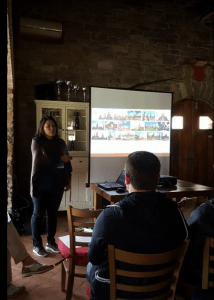Flooding is a natural, major hazard. During the past decades, all around the world, we have witnessed some of the most severe flooding. These flooding have had a really damaging impact on local communities, natural landscape and cultural heritage and, as a consequence, also on the local tourism industry. The case of the heritage site in Ayutthaya, Thailand offers some interesting reflections, which we have presented at the international conference on Tourism and Creative Industries: Trend and Challenges in Opatija, Croatia on 4-6 May 2017. The paper (‘Heritage at risk of flooding, tourism and resilient communities: The case of Ayutthaya, Thailand’) was based on the initial findings of a collaborative research project supported by the British Academy and the Thailand Research Fund under the Newton Advanced Fellowship.
Throughout our paper we acknowledged the importance of culture as the fourth pillar of sustainable development and the imperative to protect heritage sites, like Ayutthaya, from natural disasters that can have a detrimental impact on the landscapes, communities and wellbeing of the whole area. Ayutthaya, like other areas and sites in Thailand, had been affected by the big long stay flooding in 2011. This triggered a number of collaborations (amongst local communities and heritage professionals), between public and private sectors, at national and international levels, targeted to a planned protection of Ayutthaya from flooding.
Some of the recommendations highlighted in the paper were that the existing hydraulic system of Ayutthaya should be integrated into land use planning. Mutual understanding, knowledge and clear communication before, during, and after flood should be provided to all communities. Flood risk planning and disaster management, indeed, have become crucial approaches to protect and preserve cultural heritage as a key economical asset and symbol of cultural pride.


A targeted flooding adaptation strategy not only can contribute to the effective preservation of cultural heritage but it ca also be beneficial to tourism sector, which has been a main contribution to the GDP of Thailand over a few decades.
Dr Witiya Pittungnapoo
